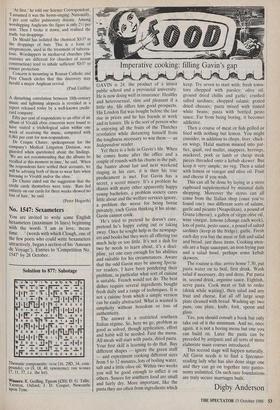; E
Imperative cooking: filling Giiistkw. jet. jett avin's gap GAVIN is 24, the product of a minor public school and a provincial university. He is now doing well in insurance. Healthy and heterosexual, slim and pleasant if a little shy, life offers him good prospects. His London flat was bought before the last rise in prices and he has friends at work and in leisure. He is the sort of person who is enjoying all the fruits of the Thatcher revolution while distancing himself from the toughness necessary to win them — an Independent reader. Yet there is a hole in Gavin's life. When he comes home after the office and a couple of rounds with his chums in the pub, the banter about last and next weekend ringing in his ears, it is then his true predicament is met. For Gavin has a secret, a secret misery. It's a problem he shares with many other apparently happy young bachelors, a problem society cares little about and the welfare services ignore, a problem the worse for being borne privately, each Gavin thinking it his alone. Gavin cannot cook. He's tried to pretend he doesn't care, pretend he's happy eating out or taking away. Once lie sought help in the newspap- ers and books but they were all offering too much help or too little. It's not a dish for two he needs to learn about, it's a disci- pline, yet one easy enough for his abilities and suitable for his circumstances. Aware that the odd Gavin may be among Specta- tor readers, I have been pondering their problem, in particular what sort of cuisine is suitable. French would not do. The best dishes require several ingredients bought fresh daily and a range of techniques. It is not a cuisine from which a simple version can be easily abstracted. What is wanted is simplicity without boredom or loss of authenticity. The answer is a restricted southern Italian regime. So, here we go, problem as good as solved, though application, effort and habit will be needed. First the menu. All meals will start with pasta, dried pasta. Your first skill is learning to do that. Buy different shapes — ignore the green stuff — and experiment cooking different sizes from 5 to 12 minutes, lots of boiling water, salt and a little olive oil. Within two weeks you will be good enough to inflict it on others. Sauces for southern food are small and fairly dry. More important, like the pasta they are often from ingredients which
keep. Try seven to start with: fresh toma- toes chopped with parsley; olive oil, ground dried chillis and garlic; crushed salted sardines; chopped salami; grated dried cheeses; pasta mixed with tinned white beans; pasta with bottled pesto sauce. Far from being boring, it becomes addictive.
Then a course of meat or fish grilled or fried with nothing but lemon. You might consider, in addition to chops, liver, chick- en wings, Halal mutton minced into pat- ties, quail, red mullet, snappers, herrings, mackerel, pork or lamb or cheap steak pieces threaded onto a kebab skewer. But keep it very simple; no veg. Then a salad with lemon or vinegar and olive oil. Fruit and cheese if you wish.
This can all be done by laying in a store cupboard supplemented by minimal daily shopping. Moreover the stores can all come from the Italian shop (once you've found one): two different sorts of salami, garlic and picante (Neapolitan), a pound of Grana (cheese), a gallon of virgin olive oil, wine vinegar, lemons (change each week), lots of pasta, pesto sauce, a pound of salted sardines (keep in the fridge), garlic. Fresh each day you buy the meat or fish and salad and bread, just three items. Cooking uten- sils are a huge saucepan, an iron frying pan and a salad bowl, perhaps some kebab skewers.
The routine is this: arrive home 7.30, put pasta water on to boil, first drink. Wash salad if necessary, dry and dress. Put pasta in, second drink, organise sauce. Eightish, serve pasta. Cook meat or fish to order (drink while waiting), then salad and any fruit and cheese. Eat all off large soup plate cleaned with bread. Washing up: two pans, one plate, knife, fork, spoon and glass.
Yes, you should consult a book but only take out of it the minimum. And no, once again, it is not a boring menu but one you can build on. Later the pasta can be preceded by antipasti and all sorts of more elaborate main courses introduced.
This second stage will happen naturally. All Gavin needs is to find a Spectator- reading lady who has also done stage one and they can go on together into gastro- nomy unlimited. On such sure foundations are truly secure marriages built.
Digby Anderson


























































 Previous page
Previous page